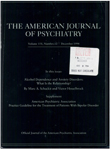Psychotherapy with Mexican-American patients
Abstract
OBJECTIVE: The authors sought to determine whether 20 years of cultural change have altered the clinical lore and earlier findings that Mexican- Americans are more resistant to psychotherapy than other ethnic groups and less likely to be referred for it. METHOD: All charts of patients seen on a university hospital psychotherapy service since its inception in 1979 were reviewed in three separate studies. The charts of all cases closed as of 1984, the charts of all active patients during 1985, and the charts of all patients screened for therapy in 1986 were included. Ethnic background, age, sex, education, income, treatment modality recommended, duration of therapy, and outcome (interrupted versus completed therapy) were recorded for each patient. RESULTS: There were minor significant differences between the Mexican-American patients and the Anglo-American patients in age and education. No other significant differences were found. CONCLUSIONS: Because of cultural change, altered psychiatric perspectives, and/or the effects of socioeconomic status as a confounding variable in previous studies, the accepted clinical lore and earlier findings about psychotherapy with Mexican-Americans may no longer apply.
Access content
To read the fulltext, please use one of the options below to sign in or purchase access.- Personal login
- Institutional Login
- Sign in via OpenAthens
- Register for access
-
Please login/register if you wish to pair your device and check access availability.
Not a subscriber?
PsychiatryOnline subscription options offer access to the DSM-5 library, books, journals, CME, and patient resources. This all-in-one virtual library provides psychiatrists and mental health professionals with key resources for diagnosis, treatment, research, and professional development.
Need more help? PsychiatryOnline Customer Service may be reached by emailing [email protected] or by calling 800-368-5777 (in the U.S.) or 703-907-7322 (outside the U.S.).



